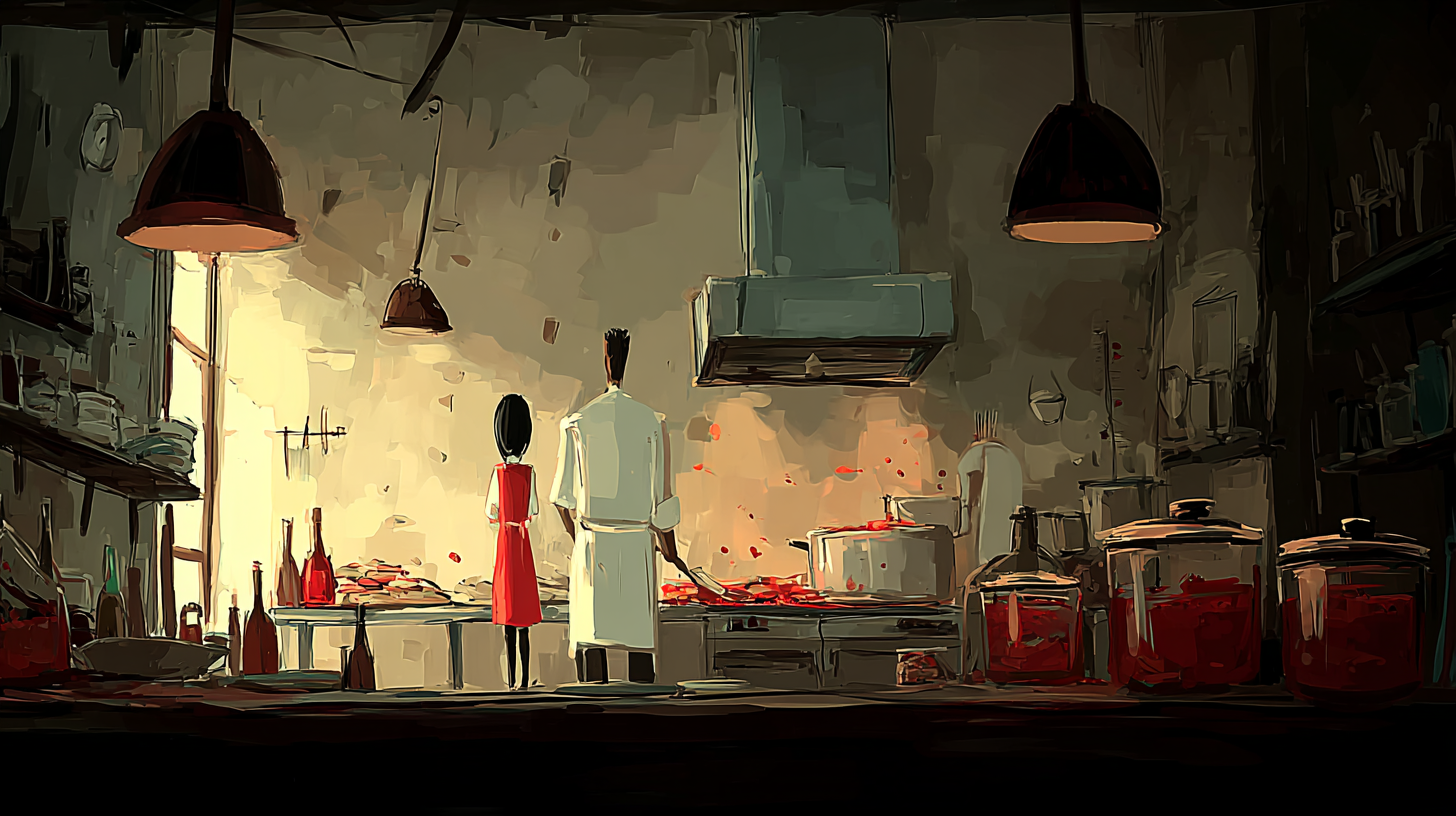“‘Cuisine’ means the special food and cooking style of a country or region.”
「cuisine」は「その国や地域の特別な料理や調理スタイル」のことです。
以下は英単語 “cuisine” に関するストーリー型学習コンテンツです。まずは大枠の意味を理解して最後の文章で確認しましょう。
「cuisine」の主な意味(main meaning)
| 品詞 | 発音記号 | 意味 | 英語例文 |
|---|---|---|---|
| 名詞 | /kwɪˈziːn/ | 料理(特に特定の国や地域の) | French cuisine is known for its rich flavors. |
「cuisine」の語源(etymology)
「cuisine」はフランス語で「台所・料理法」を意味する言葉に由来します。その起源はラテン語「coquina」(料理)です。
この単語の核となるイメージは「調理された特定の地域の食べ物」です。
「cuisine」の類義語(synonyms)
| 類義語 | 英語例文 |
|---|---|
| food | The restaurant serves delicious food from all over the world. |
| dishes | She prepared several traditional Indian dishes for the party. |
| cooking | Italian cooking uses a lot of olive oil and fresh herbs. |
| fare | The local fare includes fresh seafood and tropical fruits. |
| gastronomy | He studied French gastronomy in culinary school. |
「cuisine」の反義語(antonyms)
| 反義語 | 英語例文 |
|---|---|
| fast food | Fast food is convenient but not always healthy. |
| junk food | Children should not eat too much junk food. |
「cuisine」のコロケーション(collocations)
| コロケーション | 英語例文 |
|---|---|
| traditional cuisine | Traditional cuisine reflects a country’s history and culture. |
| local cuisine | We enjoyed the local cuisine during our trip to Thailand. |
| international cuisine | This hotel offers a variety of international cuisine. |
| fine cuisine | The restaurant is famous for its fine cuisine. |
| gourmet cuisine | He enjoys cooking and trying gourmet cuisine. |
「cuisine」の2項表現(binomials)
| 2項表現 | 英語例文 |
|---|---|
| food and cuisine | The festival featured food and cuisine from over 20 countries. |
| cooking and cuisine | She is passionate about cooking and cuisine. |
英語ストーリー(english story)
Title: A Taste of Culture
Emma had always been interested in food and cuisine. After graduating from university, she decided to work at a travel agency where she could explore international cuisine while helping others plan trips.
One day, a client asked Emma to organize a food tour in Italy. She was excited. Italy is famous for its traditional cuisine like pasta, pizza, and various cheese dishes. As she planned the trip, she researched local cuisine and discovered many fine cuisine restaurants in Rome and Florence.
She also contacted chefs who specialized in gourmet cuisine. One chef told her, “Italian cooking is all about simplicity and fresh ingredients.”
Emma made sure the tour included cooking classes. Guests could learn about cooking and cuisine from local chefs. The tour also included tasting events featuring not just Italian dishes but also international cuisine.
At the end of the tour, a guest said, “This was the best food experience I’ve ever had. I’ll never forget the local fare we tried.”
Emma smiled. She was proud that her job let her share gastronomy and culture. She believed cuisine was not just food—it was a story of a place and its people.
和訳
タイトル:文化の味わい
エマはずっと、**食べ物と料理(food and cuisine)**に興味を持っていました。大学を卒業した後、彼女は旅行会社で働くことにしました。**世界の料理(international cuisine)**を探りながら、人々の旅行計画を手伝えるからです。
ある日、顧客から「イタリアの食の旅」を企画してほしいと頼まれました。エマはわくわくしました。イタリアはパスタやピザ、チーズ料理など、**伝統的な料理(traditional cuisine)**で有名です。彼女は旅を計画しながら、**地元の料理(local cuisine)を調べ、ローマやフィレンツェにある上品な料理(fine cuisine)**のレストランをたくさん見つけました。
彼女はまた、**高級料理(gourmet cuisine)を専門とするシェフたちにも連絡を取りました。あるシェフは言いました。「イタリアの料理(cooking)**は、シンプルさと新鮮な材料が大切なんですよ。」
エマは旅に料理教室を含めることにしました。参加者たちは地元のシェフから**料理と料理文化(cooking and cuisine)**について学べます。ツアーでは、イタリア料理だけでなく、**世界の料理(international cuisine)**を試す試食会もありました。
ツアーの最後、ある参加者は言いました。「これまでで最高の食の体験だったよ。食べた**地元の料理(local fare)**は忘れられない。」
エマは微笑みました。自分の仕事で**料理文化(gastronomy)**や文化を伝えられたことを誇りに思いました。彼女は、「**cuisine(料理)**はただの食べ物じゃない。それはその土地と人々の物語なんだ」と信じていました。
「cuisine」のQ&A
- Q“「food」と「cuisine」の違いは何ですか?”
- A
“「food」は「食べ物」全体を指す一般的な言葉です。「cuisine」は特定の国や地域の料理スタイルを指します。たとえば「Japanese food」より「Japanese cuisine」の方が、料理文化や特徴を意識した言い方です。”
- Q“「dishes」と「cuisine」は同じ意味ですか?”
- A
“似ていますが違います。「dishes」は「料理一品一品」のことで、「cuisine」はその国や文化の調理スタイル全体を表します。たとえば「Italian dishes」は具体的な料理、「Italian cuisine」は料理文化や全体の特徴を指します。”
- Q“「gastronomy」と「cuisine」の違いは何ですか?”
- A
“「gastronomy(ガストロノミー)」は料理や食事の科学・芸術・文化を研究する分野を指します。「cuisine」は実際の料理スタイルや食べ物を指します。つまり、「gastronomy」は理論や考察、「cuisine」は実際の食事です。”
- Q“「fare」と「cuisine」は同じ意味ですか?”
- A
“「fare」はその土地の普段の食べ物というニュアンスがあります。「local fare」は「地元の家庭的な食事」。「cuisine」はもう少しフォーマルで、料理のスタイルや文化を意識した言葉です。”
- Q“「fast food」は「cuisine」と反対の意味ですか?”
- A
“ある意味では反対です。「fast food」は早く安く提供される食べ物で、文化的背景や調理のこだわりはあまりありません。一方「cuisine」は伝統や地域性を重んじる料理スタイルなので、対照的です。”
- Q“「junk food」は「cuisine」の反対語と考えて良いですか?”
- A
“はい、「junk food(ジャンクフード)」は健康に良くない加工食品のことを指すので、「cuisine」が持つ伝統や質の良さという意味とは対照的です。”
- Q“「traditional cuisine」と「local cuisine」の違いは?”
- A
“「traditional cuisine」はその国や地域に昔から伝わる料理全体のスタイルを意味します。「local cuisine」はその場所でしか食べられない地域限定の料理や食材に重点を置いた表現です。”
- Q“「international cuisine」とは何ですか?”
- A
“「international cuisine」は、世界中のさまざまな国の料理スタイルをまとめて指す言い方です。多国籍レストランなどで使われる表現です。”
- Q“「gourmet cuisine」とはどんな料理ですか?”
- A
“「gourmet cuisine(グルメ料理)」は、質の高い材料と技術を使った高級な料理スタイルを意味します。味や見た目に強くこだわる料理です。”
- Q“「cooking」と「cuisine」の違いは何ですか?”
- A
“「cooking」は「料理をする行為」や「調理そのもの」のことです。「cuisine」はその国や地域に特有の料理スタイル全体を意味します。”
| 単語 | 主な意味 | ニュアンスの違い・使い分け | わかりやすい例文 | 日本語訳 |
|---|---|---|---|---|
| cuisine | (国や地域の)料理 | フランス料理・日本料理など、文化的・地域的な料理スタイルを表す。 | Thai cuisine is known for its spicy flavor. | タイ料理は辛い味で有名です。 |
| cooking | 料理(すること) | 「料理をすること」全般を指す、動作・スキルに近い。 | My mom is good at cooking. | お母さんは料理が上手です。 |
| cooking style | 料理のやり方・スタイル | 揚げる・蒸す・煮るなど、調理方法の違いを表す。 | Steaming is a healthy cooking style. | 蒸すのはヘルシーな料理法です。 |
| gastronomy | 美食学(かたい言い方) | フランス語由来のフォーマルな言い方。料理を文化や芸術としてとらえる言葉。 | He studies French gastronomy at university. | 彼は大学でフランスの美食学を学んでいる。 |
| fare | 出される食事・料理 | メニューに出る「料理の内容」の意味で使われることが多い。やや文語的。 | The restaurant offers traditional local fare. | そのレストランは伝統的な郷土料理を出しています。 |
ポイントまとめ
- cuisine:一番よく使われる「○○料理」。文化や地域に焦点。
- cooking:動作としての「料理すること」。
- cooking style:調理法の違い(焼く・揚げるなど)。
- gastronomy:フォーマルな「料理学・美食学」。
- fare:出される料理・メニュー内容(ややかたい表現)。



コメント